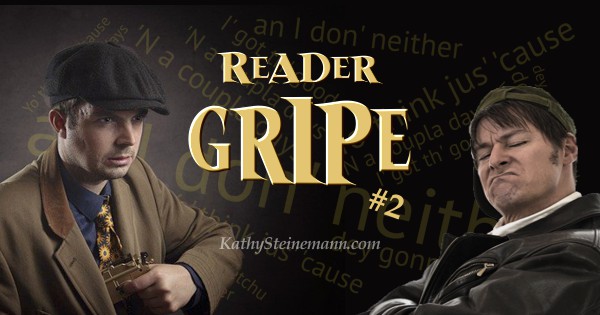
Do You Make This Mistake When You Write?
This series of articles discusses hurdles that cause reader confusion.
Confusion = gripes = lost readers.
Here’s article #2. Do you see the problem? How would you fix it?
Introduction to Excerpt
Try reading the following verbal altercation between Wart and Sasha out loud.
Excerpt
“’E don’ care wha’ yo s’pose,” Wart said, “an’ I don’ neither. Ev’body no th’ truth, drefful as ’tis, an’ ev’body sayin’t. I tell yo agin, ’em guys’re tryin’ ta kill th’ l’l weesel, bu’ wha’ wi’ all th’ kops watchin’ ’is place —”
“Po-lice! Yo’ think jus’ ’cause th’ po-lice’re watchin’ ’im, ’e’s gonna be a’right? Yo’ crazy,” Sash answered.
“Crazy? Yo th’one wha’ crazy, bro. ’N a coupla days th’ po-lice gonna get Monk, dey gonna getchu an’ ev’one else wha’ no ‘im.”
“Hmmph. Nob’dy dare mess wi’ me, ’cludin’ th’ po-lice, th’ DA, an’ all there dawgs. Munny talk, man. ’Sides, I’ got th’ goods on to many kops. They don’ dare lay a finger’n me.”
Here’s the Problem
At first glance, the glut of apostrophes makes the text look like an alien wrote it. But aliens would be more likely to use correct language than rely on the polluted version of English in the excerpt.
How long did it take you to read the paragraphs? Did you understand every word, or did you falter and have to puzzle over some of them?
What about the misspelled homophones, no/know, weesel/weasel, cops/kops, there/their, munny/money and to/too?
Would you be able to figure out who was talking if you had to read a few paragraphs of back-and-forth between these characters?
Dialect aggravates readers, unless handled artfully like J.K. Rowling in the Harry Potter books or Diana Gabaldon in The Outlander series.
Here’s One Solution
“He don’ care what you suppose,” Wart said, “and I don’ neither. Everybody know the truth, dreadful as ’tis, and everybody sayin’ it. I tell you again, them guys’re tryin’ to kill the little weasel, but what with all the cops watchin’ his place —”
“Police! You think just because the police are watching him, he’s gonna be all right? You’re crazy,” Sash answered.
“Crazy? You the one what crazy, bro. In a coupla days the police gonna get Monk, they gonna get you an’ everyone else what know him.”
“Hmmph. Nobody dares mess with me, including the police, the DA, and all their cronies. Money talks, man. Besides, I’ve got the goods on too many cops. They don’t dare lay a finger on me.”
Takeaways
Homophone misspellings don’t belong in dialogue. When people speak, they don’t create dialogue balloons above their heads.
Writing should convey unique speech characteristics that don’t slow narrative; i.e. Wart and Sash shouldn’t sound like identical twins. With the suggested changes, even in untagged conversation, readers will be able to figure out who’s talking.
Another approach would be to make Sash’s dialogue similar to Wart’s, but give him an idiosyncrasy. For instance, he could refer to Wart and himself by name instead of saying you, your, I, or me.
Like this: “Wart crazy. Nobody dare mess with Sash, no police, no DA, no dawgs. Money talk, bro. Besides, Sash got goods on lotsa cops. They don’t dare lay a finger on Sash.”
Wart could also have his own idiosyncrasy. Perhaps he likes a phrase like ye know or of course.
P.S.
Try typing the first three words of the excerpt: ’E don’ care (in a font like Verdana, where the directionality of apostrophes is easy to see).
What you’ll get is: ‘E don’ care, with the first apostrophe facing the wrong way. You can get around it by typing the following key sequence:
[H] [‘] [E] [CURSOR LEFT] [CURSOR LEFT] [BACKSPACE] [CURSOR RIGHT] [CURSOR RIGHT] [SPACE] [don’ care]
But consider how much that slows writing, and how cumbersome it renders the editing process.
The Writer’s Lexicon series
and additional resources on my Facebook page.
Discover more from KathySteinemann.com: Free Resources for Writers
Subscribe to get the latest posts sent to your email.

Word choice and word order in dialogue render misspellings unnecessary. (Such as: “Do you not think?”) Also, choosing a couple of phrases to repeat in dialect reminds the reader without annoyance. For instance, using “ken” for “know” or (as suggested) “ye” for “you” indicate Scottish. Local and regional slang can be effective, too. (Any doubt where “That dog don’t hunt” turns up?) Dunno, gonna, ain’t, and similar words are known and accepted misspelings, so those help, too.
Good observations, Mari!
I had a prof who spent two full class sessions on how not to use dialect. 😉